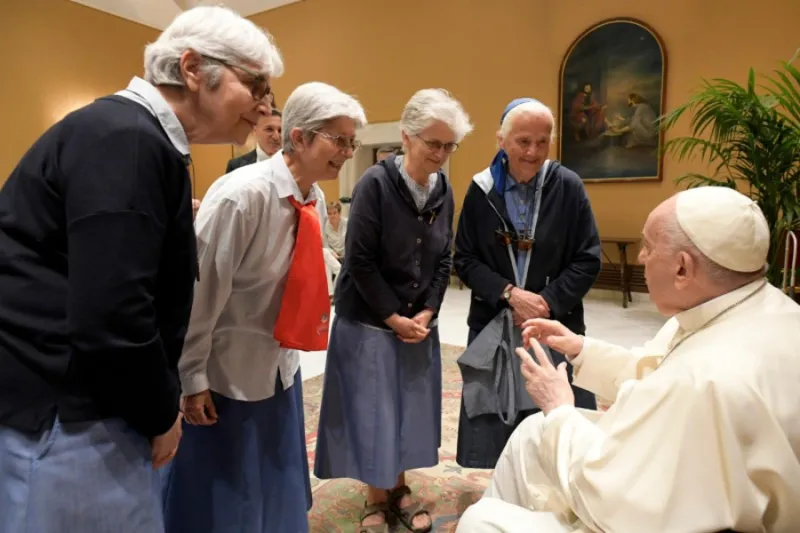 Pope Francis meets members of the Charles de Foucauld Spiritual Family Association in the study of the Paul VI Hall, May 18, 2022. / Vatican Media.
Pope Francis meets members of the Charles de Foucauld Spiritual Family Association in the study of the Paul VI Hall, May 18, 2022. / Vatican Media.
Vatican City, May 18, 2022 / 06:03 am (CNA).
Pope Francis said on Wednesday that learning about St. Charles de Foucauld’s spirituality helped him during a period of crisis as a theology student.
“I would like to thank St. Charles de Foucauld, because his spirituality did me so much good when I was studying theology, a time of maturation and also of crisis,” the pope said on May 18, during a meeting with members of the Spiritual Family of Charles de Foucauld.
The association’s members were in Rome for the May 15 canonization of the French explorer who became a hermit and missionary in Algeria, and who was killed in 1916.
Pope Francis said he learned about St. Charles de Foucauld from the Italian priest Father Arturo Paoli and books by René Voillaume, which he said he had read often.
Charles de Foucauld “helped me so much to overcome crises and to find a way of Christian life that was simpler, less Pelagian, closer to the Lord,” the pope said. “I thank the saint and bear witness to this, because he did me so much good.”
During the meeting, which was held in a room off of the Vatican’s Paul VI Hall before his general audience, Francis did not offer more details about the crisis he experienced as a theology student.
The pope studied theology as a seminarian from 1967 to 1969. In 1986, he spent three months at the Sankt Georgen Graduate School of Philosophy and Theology in Frankfurt, Germany, where he began a doctoral dissertation on Romano Guardini, an Italian-born German priest.
His studies were cut short when the Jesuits called him back to Argentina to be a spiritual director in Córdoba and his dissertation was never finished.
At the meeting on Wednesday, Pope Francis called Charles de Foucauld “a prophet of our time, who was able to bring to light the essentiality and universality of faith.”
The Trappist priest condensed the meaning of belief, the pope said, “into two simple words, in which there is everything: ‘Jesus — Caritas.’”
Francis quoted a letter of the martyred saint, who wrote to his cousin Marie de Bondy in 1915, while “in the silence of the hermit life,” that “we are inclined to put first works, whose effects are visible and tangible, God gives first place to love and then to sacrifice inspired by love and obedience resulting from love.”
“As a Church,” the pope said, “we need to return to the essentials, not to get lost in so many secondary things, at the risk of losing sight of the simple purity of the Gospel.”